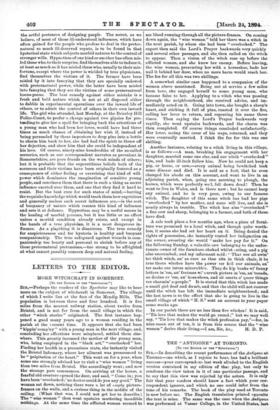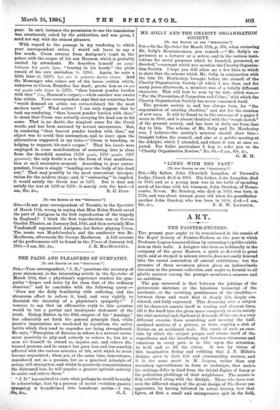THE " ANTIGONE " AT TORONTO.
[To THE EDITOR OP THE " SPECTATOR."]
SIR,—In describing the recent performance of the Antigone at Toronto—one which, as I rejoice to hear, has had a brilliant success—your correspondent last week alluded to the English version contained in my edition of that play, but only to the view taken in it of one particular passage, and to say that this view was rejected by the actors. It is only fair that your readers should know a fact which your cor- respondent ignores, and which no one could infer from the tone of his remarks. The book of the play used at Toronto is now before me. The English translation printed opposite the text is mine. The same was the case when the Antigone was performed at Vassar College, in the United States, last Tear:- In each instance the permission to arse the.translation: was courteously asked by the authorities, and was given, I used not say, with the utmost pleasure.
With regard to the passage in my rendering to which your correspondent refers, I would ask leave to say a -few words. Creon returns from Antigone's tomb to the palace with the corpse of his son Haemon, which is probably -carried by attendants. He describes himself as Fritz.'
;cwt.); Exrd,, "bearing in his hands" the plain record of his own unwisdom (v. 1258). Again, he says a little later (v. 1297), Iv.) !him iv xEipwers apzirrs r'u'op. And -the Messenger who comes out of the house (within which, unknown to Creon, Eurydice lies dead), greets him as Tel Far repo XEIPZY roide (pipe.), (v. 1279), "thou bearest yonder burden with thee" (i.e., Haemon's corpse),—while another woe awaits him within. Your correspondent says that my rendering here "would demand an action too extraordinary for the most modern taste." What action ? I can only suppose that he -took my rendering, " thou bearest yonder burden with thee," -to mean that Creon was actually carrying his dead son in his arms. That is, no doubt, the simplest sense for the Greek words, and has been assumed by several interpreters. But, in rendering "thou bearest yonder burden with thee," my -object was to avoid that assumption, and to leave open the alternatives suggested in my note,—" Creon is touching, or helping to support, his son's corpse." That his hands were ,employed in some manifestation of sorrowing love is clear from the threefold mention (1258 xrrpos, 1279 xrtirZy, 1297 xripreury); the only doubt is as to the form of that manifesta- tion at each successive moment. According to your corres- pondent, Creon is simply "bending over the body of his dead -son." That may possibly be the most convenient interpre- tation for the modern stage ; and, if " embracing " be implied, it would satisfy the Greek text at 1297. But it does not satisfy the text at 1258 or 1279: it merely cuts the knot.—I



































 Previous page
Previous page